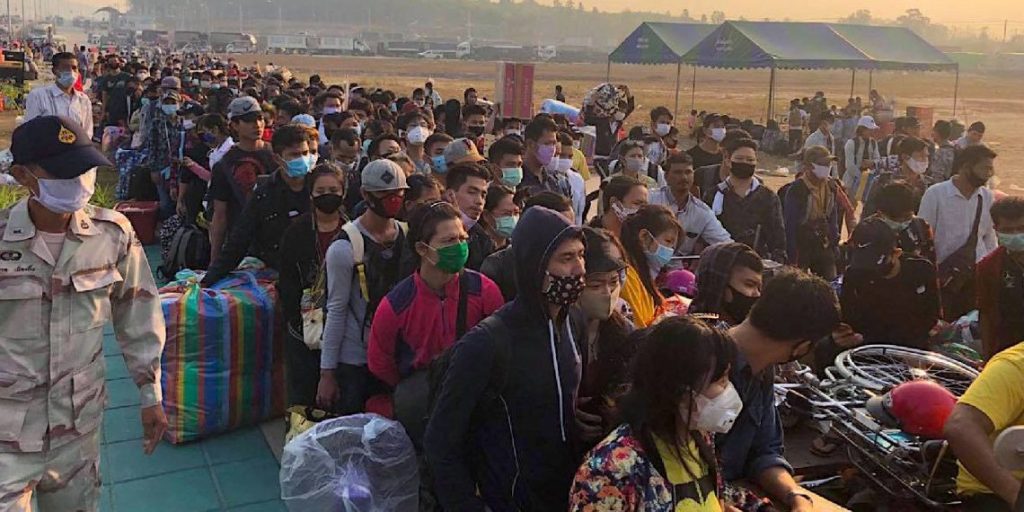Yangon requires migrant workers to remit to junta banks
Those who do not comply with the new rule will be prevented from working abroad for three years after their work permit expires. Military representatives announced that the Russian credit card payment system, called Mir, will be implemented. While the army is criticised for using cluster bombs, Moscow sends the first batch of fighter jets.
Yangon (AsiaNews) - Myanmar's coup junta has asked Burmese workers who go abroad - particularly to Thailand - to pay at least 25% of their remittances through the national banking system.
The measure, which came into force on September 1, was imposed by the cash-strapped military through CB Bank, writes the website The Irrawaddy, a local newspaper that continued to monitor the situation in Myanmar even after the coup d'état in February 2021 On that date the Burmese army seized power, ousting the government led by Aung San Suu Kyi, starting a brutal civil conflict.
Those who do not comply with the new rule, continues the bank's statement, will be prevented from working abroad for three years after the expiry of their work permit. From now on, anyone who migrates abroad will be forced to open a joint account at the Central Bank of Myanmar, where at least a quarter of their salary will have to be paid, before they can leave.
The decision, however, risks impoverishing migrant workers and families who receive remittances at home due to the use of official exchange rates, which are very different from the market ones used to send money informally through hundi intermediation ( sometimes also called hawala), the Asian practice through which a trustee is responsible for transferring money from one person to another.
At the moment, one US dollar is officially worth 2,100 kyat, while the market value stands at 3,400 kyat. The same thing therefore applies to Asian currencies: one Thai baht (around 2 million Myanmar citizens work legally in Thailand) is converted to 100 kyat in the informal market, compared to the 56 that are exchanged by the Burmese army. Since the coup, 400,000 people have left Myanmar for Thailand with regular work permits.
Army spokesmen also announced that the Russian Mir payment system (a word that translates as "peace") could come into operation from next month, in a context in which ties between representatives of the Burmese army and Russian officials they get tighter and tighter.
The communication came from Kan Zaw, Minister of Investment and Foreign Economic Relations of the junta, who declared it on the sidelines of the Eastern Economic Forum in Vladivostok, Russia, adding that the two countries are evaluating the negotiation of an agreement on the conversion of national currencies.
Mir is a card payment system similar to Visa and MasterCard, and was established by the Russian Central Bank in 2017 in response to Western sanctions.
In one week, as many as five officials from the Burmese coup junta went to Russia, after direct flights between Yangon, Mandalay and Novosibirsk restarted last week after 30 years. In the next few days the junta's Foreign Minister, Than Shwe, will also travel to Belarus, which like Moscow sells weapons to the Burmese regime.
At the moment, in fact, the most prosperous exchanges between the two countries are those involving weapons: the Minister of Trade of the military junta, Charlie Than, declared to the Russian state news agency RIA Novosti that the Burmese army has received the first batch of two Russian Su-30 fighter jets, after Moscow and Yangon signed an agreement for the supply of six jets in total in September 2022.
These are the same fighter jets responsible for killing hundreds of Burmese civilians. A recent report drawn up by the Cluster Munition Coalition criticized the use on several occasions (most recently in June) of cluster bombs by the Burmese military junta in the states of the country where the strongholds of the anti-coup resistance are concentrated. These are weapons similar to those used by Russia in Ukraine and which, according to the investigation, killed or injured civilians in 95% of cases during 2022.







.png)










